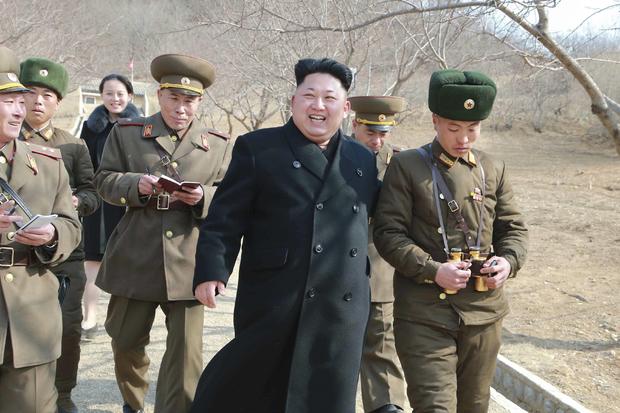N. Korea years away from submarine missiles, U.S. says
WASHINGTON - North Korea is "many years" away from being able to launch ballistic missiles from a submarine but that capability could eventually pose a threat to U.S. allies Japan and South Korea, a top U.S. military officer said Tuesday.
North Korean state media reported leader Kim Jong Un observing the test of such a missile earlier this month. Photos showed a projectile rising from the sea's surface and Kim smiling from a distance at what looked like a floating submarine. Kim declared it to be a "world-level strategic weapon."
Adm. James Winnefeld, vice chairman of the Joint Chiefs of Staff, told a Washington think tank that the North Koreans "have not gotten as far as their clever video editors and spinmeisters would have us believe."
"They are many years away from developing this capability. But if they are eventually able to do so it will present a hard-to-detect danger for Japan and South Korea as well as our service members stationed in the region. This only reinforces the importance of regional ballistic missile defense," Winnefeld told the Center for Strategic and International Studies.
He did not elaborate on what deception may have been involved in the portrayal of the test by North Korea. Experts at U.S.-based think tanks say that the missile is in an early stage of development and may have been launched from a submerged barge rather than a submarine.
The test, nevertheless, deepened international concern over North Korea's weapons development despite sanctions intended to impede that effort. The North already has hundreds of land-based ballistic missiles and is also believed to be advancing in efforts to miniaturize nuclear warheads to mount on such missiles. U.S. officials have said North Korea may be capable of fielding a nuclear-armed missile that could reach U.S. soil but has not tested it yet.
During a visit to Seoul on Monday, Secretary of State John Kerry accused North Korea of "flagrant disregard for international law" by continuing to build its nuclear bomb and missile programs even as it oppressed its own people. He reassured South Korea of America's "ironclad" security commitments to its ally.
Winnefeld reiterated Washington's interest in deploying an advanced U.S. missile defense system, called the Theater High Altitude Area Defense, or THAAD, in South Korea but said there have not been formal negotiations on it with Seoul.
"It goes without saying that the ROK will have to want to have this system in place or we simply won't put it there," he said, referring to South Korea's formal title, the Republic of Korea.
Regional power China is concerned the system could be used against it, and opposes its deployment.
